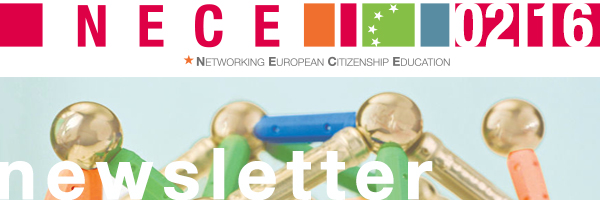 |
||||||||||||||||||||||||||||||||||||||||||||||||||||||||||||||||||||||||||||||||||||||||||||||||||||||||||||||||||||||||||||||||||||||||||||||||||||||||||||||||||||||||||||||||||||||||||||||||||||||||||||||||
 |
Follow NECE on twitter and linkedIn. The NECE Conference hashtag is #NECE2016. |
|||||
| NECE NEWS | ||||||
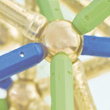 |
NECE 2016 „Crossing Borders. Migration and Citizenship Education in Europe“
10-12 November, 2016, Zagreb, Croatia |
|||||
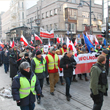 |
Political Changes in Poland – a Threat to Citizenship Education?
Since winning the election in October 2015, the Polish Law and Justice government now in power has been doing it’s best to follow the authoritarian course set by Hungarian Prime Minister Viktor Orbán. That’s the conclusion reached by Jan Werner Müller in his article The Problem with Poland. Its right-wing conservative leaders, he says, have “attacked the constitutional court, undermined Poland’s independent civil service, and set out to bring the public media under government control.” The situation in the country is certainly tense. But are the recent developments also a threat to cultural and citizenship education in Poland? NECE interviewed Vice President of the Polish Center for Citizenship Education Alicja Pacewicz to hear her personal opinion on the topic, as well as her thoughts on the current political situation in Europe, her work in Polish citizenship education and education in general. The full transcript of the interview is available on our website.
|
|||||
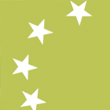 |
Focus Group Exchange between Europe and North Africa
When the members of the focus group met in Tunis (Tunisia) from 16-18 May 2016, a major issue was the NACE Project (Networking Arab Civic Education), which was announced publicly during the Civic Education Conference. Participants discussed the vision behind the NACE, what core values and objectives it should present and pursue, and what shape its organizational structure should have.
In the second part of the meeting, representatives from DEDI (The Danish Egyptian Dialogue Institute) presented the recently completed mapping study “The road to Citizenship Education in Egypt”. They also announced that DEDI is planning to establish a new department to work on these kinds of studies. Participants were very positive about both the publication and plans to extend activities in the area.
|
|||||
| EURO-MED COOPERATIONS | ||||||
 |
Second Civic Education Conference in Tunisia
Within the framework of the second Civic Education Conference (13-15 May 2016), about 200 experts, academics and practitioners from 31 countries gathered in Tunisia to discuss the current state of civic education in the MENA states. In topical workshops, they developed 37 recommendations directed at strengthening civic education in the region. In addition, participants were introduced to the NACE (Networking Arab Civic Education) initiative.
|
|||||
| GOOD PRACTICE: IDEAS & EXAMPLES | ||||||
 |
GONG
GONG is a Croatian civil society organisation founded in 1997 to encourage citizens to participate actively in political processes. Its goal is promoting and elevating human and civil rights, as well as encouraging and empowering citizens to participate in political processes. Within its programmes, the organisation works to ameliorate the Croatian electoral system by helping ensure transparency and political participation. GONG promotes activism and citizen cooperation, along with CSOs and education for responsible and active citizenship. The organisation also monitors EU institutions, enhancing advocacy and working to influence the decision-making process.
|
|||||
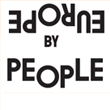 |
Europe by People – The Future of Everyday Living
In January 2016, the Netherlands took over the Presidency of the European Union. For over six months, Amsterdam has been not only the continent’s political capital, but also its cultural one, and has set an inspiring example for Dutch society as a whole – not least by providing solutions for everyday living, and being a canvas on which creatives and citizens can paint a picture of Europe’s future. |
|||||
 |
ERSTE Foundation – European Debates
ERSTE Foundation is striving for the creation of a united Europe with consolidated values. It supports the European unification process in Central and Southeast Europe, and actively seeks to assist existing EU enlargement initiatives, to work against prejudice and nationalism, to help integrate thinking and living across borders, and to make these experiences accessible. One way to reach those goals is to strengthen think-tank capacity in Central, Eastern and Southeast Europe, as well as in the EU as a whole, and in particular regarding CEE issues. Because know-how transfer within the wider region needs to be improved, the ERSTE Foundation regularly organises public panel discussions and internal workshops, and supports publications on European issues and the work of think-tanks such as the European Stability Initiative.
|
|||||
| POLITICS & POLICIES & CITIZENSHIP EDUCATION | ||||||
|
Strategic Engagement for Gender Equality 2016 – 2019
At the end of 2015, the European Commission published "The Strategic engagement for gender equality 2016 – 2019", which sets the framework for the Commission's future work towards improving gender equality. The strategic engagement sets out objectives in five priority areas, and identifies more than 30 concrete actions. It reaffirms commitment to gender mainstreaming, and emphasizes a gender equality perspective that will be integrated into all EU policies, as well as into EU funding programmes. The strategic engagement also supports the implementation of the gender equality dimension in the Europe 2020 Strategy.
|
||||||
|
Securing Democracy through Education
EU Ministers of Education met for the 25th session of the Council of Europe Standing Conference in Brussels on 11-12 April 2016. The final declaration on the conference theme, which was “Securing Democracy through Education – The development of a Reference Framework of Competences for Democratic Culture”, can be found here:
|
||||||
|
European Alternatives Supports Protestiram Demands and #colourfulrevolution in Macedonia
25 years after the referendum that established Macedonia's independence, its citizens are standing up in defence of their democracy and the rule of law. The civil society organisation and citizen movement European Alternatives supports demands being made by the Protestiram and Colourful Revolution in Macedonia.
|
||||||
| CALLS | ||||||
|
Call for Papers – Journal of Character Education
Peer-reviewed manuscripts can now be submitted for the 2016 issue of the Journal of Character Education. Submissions should deal with research and practical applications that focus on ideas for integrating character education, social-emotional learning, and civic education into the Common Core and/or newly signed ESEA curricula of schools. A paper should also describe best practices in teaching and learning related to integration of character education in 21st century curricula.
|
||||||
|
Call for Papers – the European Union in International Affairs (EUIA)
Paper abstracts and panel proposals are being accepted for the fifth European Union in International Affairs (EUIA) conference. The event encourages the submission of abstracts that integrate empirical examples from different fields of policy and law focusing on ‘the EU in the world’. More precisely, abstracts should relate to one of the following conference sections: foreign and security policy, environment and sustainable development, (im)migration and diversity, or economic governance.
|
||||||
| EVENTS | ||||||
|
Social Justice in Times of Crisis and Hope: Young People, Well-being and the Politics of Education
Barcelona (Spain), 6-8 July 2016 |
||||||
|
IUNC Middle East & Africa 2016 – The 2nd Annual International Universities Networking Conference + Edu Agency Workshop
Istanbul (Turkey), 25-26 October 2016 |
||||||
|
You can find more current publications on citizenship education in Europe at the NECE website. |
||||||